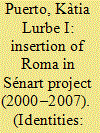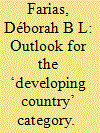| Srl | Item |
| 1 |
ID:
181898


|
|
|
|
|
| Summary/Abstract |
This article reveals the malleability of the boundaries between political and analytical categories related to internal migration in China. The author analyses the iterative process of categorisation, which, far from being neutral, settled, and objective, comes within government intervention strategies. Statistical categories, media practices, and the scientific understanding of migration by social sciences all dovetail with each other, showing themselves to be subject to evolving political, economic, and urban landscapes. This paper shows that the categories of spatial mobility do not correspond to those of urban integration, with implications that are not only of an administrative, material, and spatial nature but also concern identity issues.
|
|
|
|
|
|
|
|
|
|
|
|
|
|
|
|
| 2 |
ID:
141465


|
|
|
|
|
| Summary/Abstract |
Between 2000 and 2007, 34 Romanian families living in shanty towns in a Parisian suburb participated in a local group-specific social integration project. A socio-anthropological study was undertaken 2 years after it ended, including documentary analysis of its archives, interviews with its beneficiaries and the professionals involved and ethnography among three families with distinct integration histories. Using the analysis of the project’s implementation and outcomes, this article sheds light on how exceptional acts of minority identity recognition – sporadic and on a case-by-case basis – were ultimately functional in the performance of a republican redistributive policy on individual access to rights and resources based on the denial of racialised inequalities.
|
|
|
|
|
|
|
|
|
|
|
|
|
|
|
|
| 3 |
ID:
165073


|
|
|
|
|
| Summary/Abstract |
In the 2016 edition of its World Development Indicators (WDI), the World Bank introduced an important change in the way it categorises countries: it explicitly stated the intention to eliminate the distinction of countries as ‘developing’ and ‘developed’. This decision represents the first time one of the world’s most powerful and influential international organisation has overtly decided to move away from this fuzzy-yet-ubiquitous terminology for categorising countries (and not proposing to replace the division). This paper takes this shift to discuss country groupings based on development levels, particularly the ‘developed’/’developing’ dichotomy, focusing on the latter term. The paper argues for a paradoxical scenario, wherein the label ‘developing’ will increasingly become analytically useless while concurrently retaining – or even strengthening – its power in the context of foreign policy strategies. The analysis details the motives behind this paradox and provides a reasoning for when and why the term’s usage is likely to be weakened or strengthened. Simply put, the ‘developed’/’developing’ dichotomy is weakening in its analytical capacity, mostly due to the increasing heterogeneity among countries under the ‘developing’ label and concurrent porosity of ‘boundaries’ between the two categories, while showing little sign of being phased as a term for self-identification.
|
|
|
|
|
|
|
|
|
|
|
|
|
|
|
|